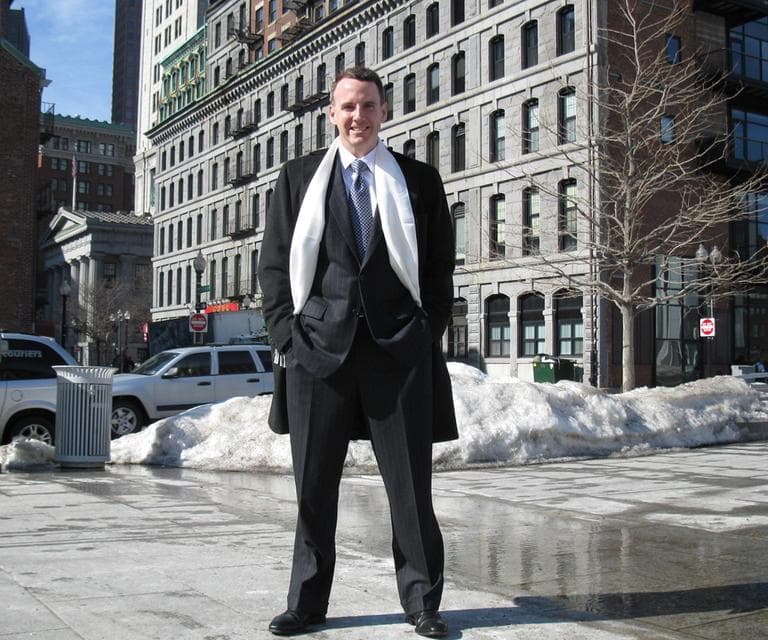Advertisement
Downtown: The Lights Are Much Brighter There

Ed Glaeser says cities have an unfair reputation. Far from concrete jungles of crime and litter, Glaeser says cities are modernity at its best — crucibles where new ideas and industries are born.
We hit the streets of Boston with Glaeser to find out why we should be celebrating the "Triumph of the City."
We began our tour at the Old State House, the site of the Boston Massacre. Cities are essentially areas of population density, and it's that quality that makes them breeding grounds for change. In fact, Glaeser said, America's history is made in its cities.
"The ideas that came together to create the American Revolution were ideas that were made possible by having such a wide range of smart, intelligent, active people in this city," Glaeser said.
The qualities that brought together the Sons of the Liberty are all the more critical in the digital era. Even though communication technology like cell phones and the Internet have enabled people to stay in touch over long distances, Glaeser said that globalization has made new ideas all the more valuable, many of which need to be explained face to face.
"Cities don't make people poor. Cities attract poor people. They attract poor people because they deliver things that people need most of all — economic opportunity."
Ed Glaeser
"The fundamental thing here is that we are at our heart a social species," Glaeser said. "Sure, we can communicate low-intensity ideas effortlessly over the Web. But to really communicate — to get the most complicated notions across — you actually have to connect with your audience. You actually need to see what they're seeing."
The Old State House, of course, is a building from another time. To visit it now, the lovely red brick building with its golden weathervane and cameo windows looks downright quaint surrounded by the city's commercial bustle and mile-high skyscrapers. Cities change. They grow up, they grow out. Residents move in, others leave. Industries dwindle and new ones fledge and prosper. When cities allow themselves to be dynamic, they succeed. Glaeser says this is particularly important in one area: housing.
"Boston needs to grow up," Glaeser said.
Glaeser wasn't talking about maturity. Walking down Milk Street in the heart of the financial district, Glaeser meant cities need to grow up — as in, to the sky. If property space is overly restricted through height limitations, strict preservationist statutes and other zoning laws, Glaeser says the city's housing stock will be strangled. And when that happens, real estate soars, and eventually residents get priced out.
Advertisement
"While it's nice to keep sunlight and views, there's always a cost to that as well," Glaeser said. "And the cost is that Boston becomes more expensive, more exclusive, and in some sense, less vibrant."
Our tour took us to the Rose Kennedy Greenway, near to the Boston Harbor. Boston's seaport was once a font of work for the urban working class, and a provider of social mobility. It's where Patrick Kennedy first found work after arriving from the poor farms of Ireland, setting the stage for one of the the great American dynasties.
"The fact that there are poor people living in Boston is not something Boston should ever be ashamed of," Glaeser said. "The fact that there is urban poverty is not something cities should be ashamed of. Because cities don't make people poor. Cities attract poor people. They attract poor people because they deliver things that people need most of all — economic opportunity."
Another misconception Glaeser said he wants to expel is the idea that living in the countryside is somehow more environmentally friendly than living in the city. The carbon emissions created by urban dwellers is substantially lower — 40 percent on average — than those created by their rural counterparts. Glaeser said that's not just due to public transportation and shorter driving commutes.
"If you're living in an urban apartment, you're just using much less electricity and much less home heating than if you're living in a large suburban house," Glaeser said.
Despite his love of the city, and the many benefits he sees to urban life, Glaeser admitted that he doesn't in fact live in one.
"About five years ago my wife and I did what millions of Americans do throughout the country, and we chose a suburb," Glaeser said.
Glaeser said there were a variety of reasons he moved to the suburbs. The home interest deduction, highway infrastructure and local school systems all contributed to his move. And Glaeser said that's a problem and evidence of how public policy stacks the deck against cities. Glaeser said because of all the good that comes out of city life — both personal and municipal — people should take a hard look at the policies that are driving residents into the suburbs.
Besides, Glaeser said, it's not like he's completely given up the city.
"While it's true that I go to sleep in a suburb — my work, my productivity happens in cities," Glaeser said. "And when I have a free weekend day with my kids — when I can convince them to get in the car and emit a little more carbon — we come here."
Guest:
- Ed Glaeser, author of "Triumph Of The City;" Economics Professor at Harvard University
This program aired on February 21, 2011.